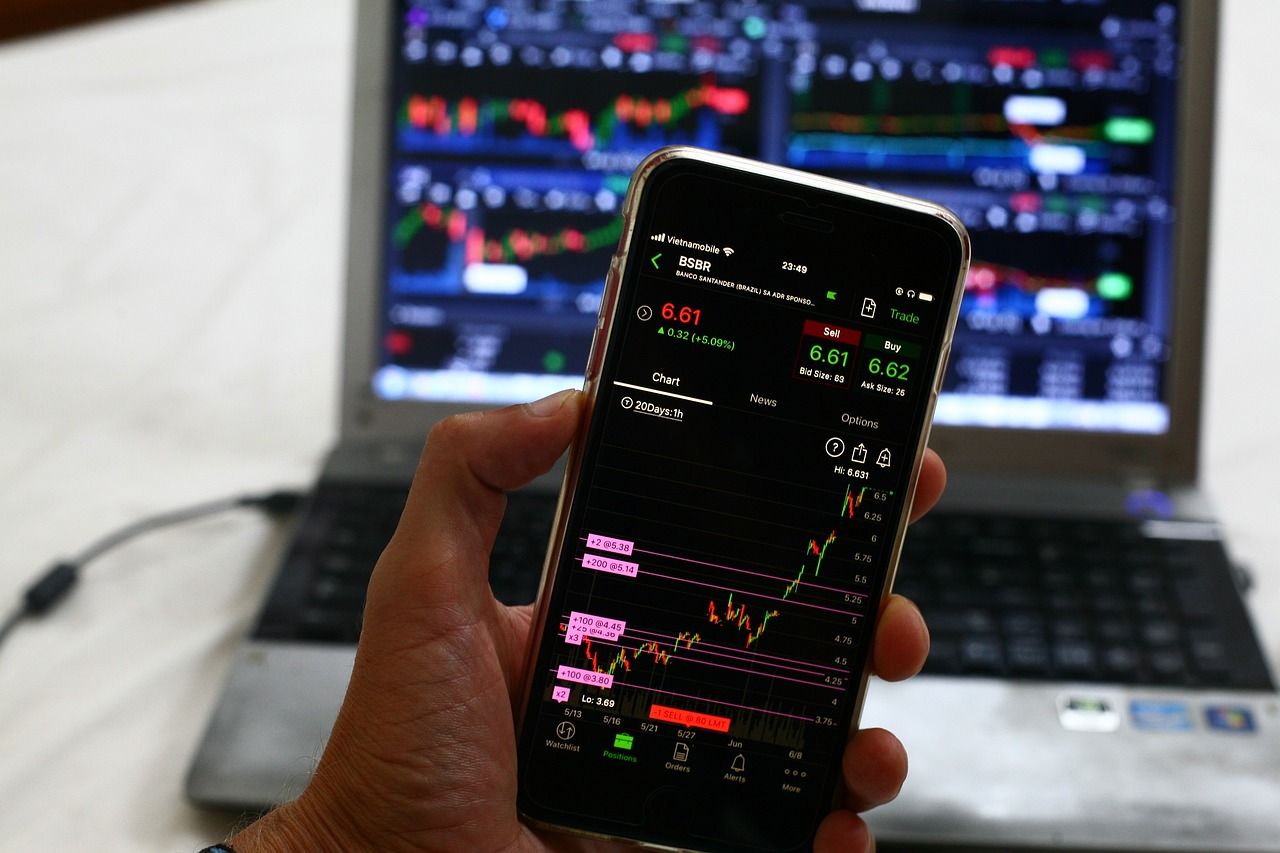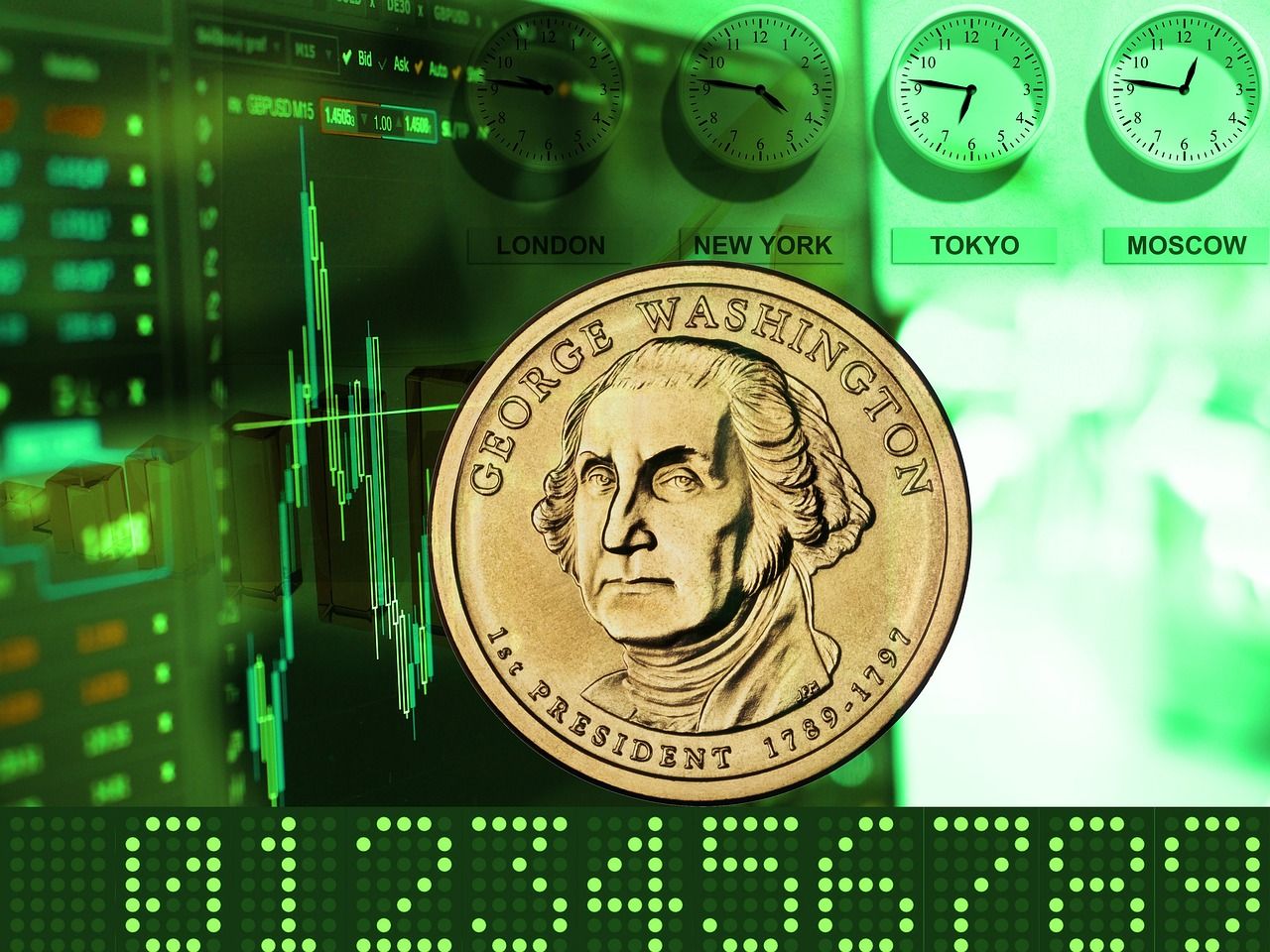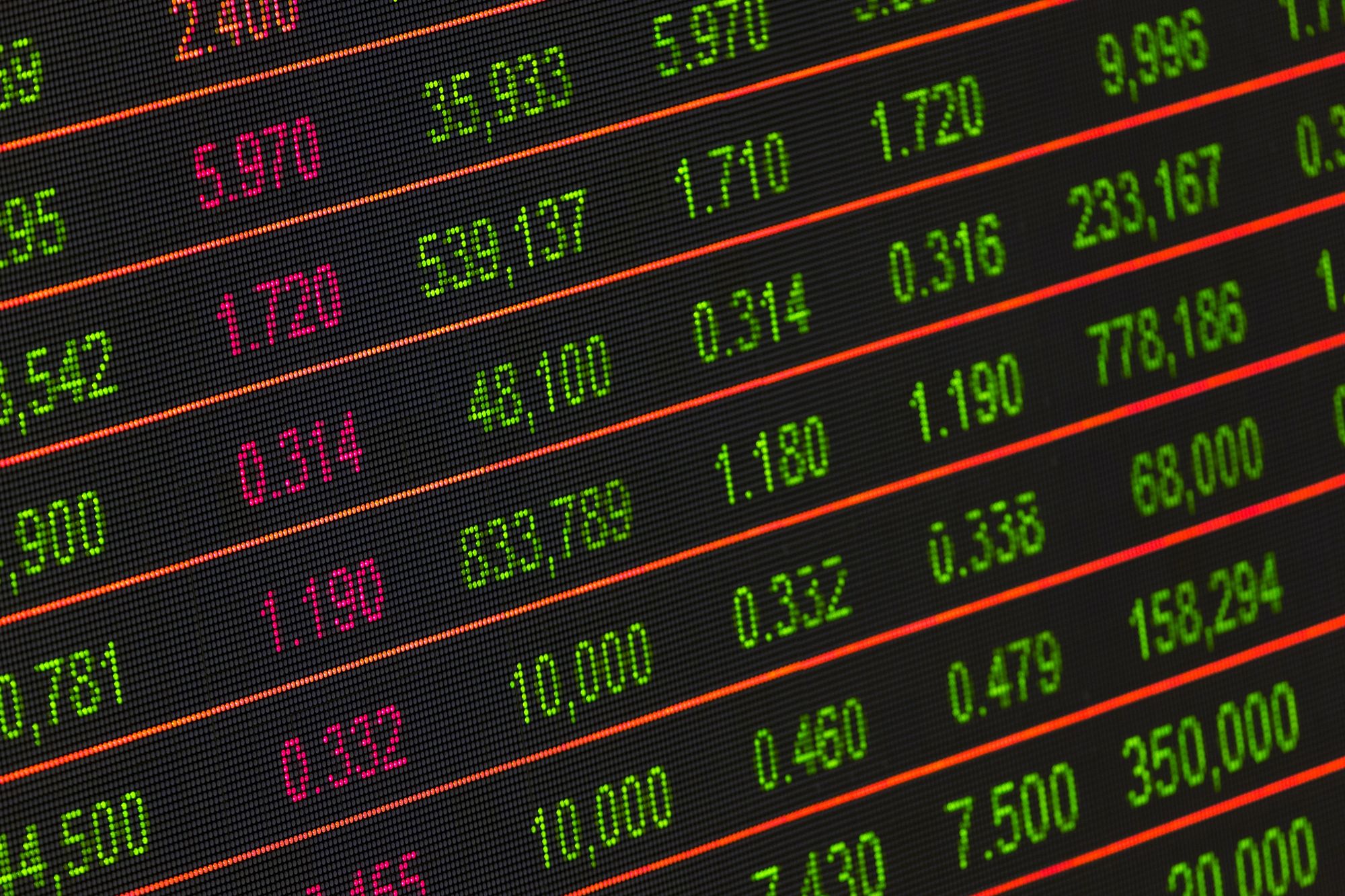The Ultimate Guide to Choosing the Best Stock, Forex, and Crypto Trading Platforms
1. Introduction
With the rise of digital currencies and the accessibility of online trading, more and more individuals are looking to invest in stocks, forex, and cryptocurrencies. However, with a plethora of trading platforms available, it can be overwhelming to choose the right one that meets your specific needs and goals. In this comprehensive guide, we will walk you through the key factors to consider when selecting a trading platform, as well as provide an overview of the top platforms in the market. Whether you are a beginner or an experienced trader, this guide will help you make an informed decision and embark on a successful trading journey.

2. Understanding the importance of choosing the right trading platform
Choosing the right trading platform is crucial to your success in the world of stocks, forex, and cryptocurrencies. The platform you select will determine the ease of executing trades, accessing trading tools and resources, and ultimately, your profitability.
Here are some key reasons why selecting the right trading platform is essential:
1. User-Friendly Interface: A well-designed and intuitive platform can make a significant difference in your trading experience. It should be easy to navigate, with clear and concise sections for executing trades, analyzing charts, and accessing account information. A complicated or confusing platform can lead to costly mistakes and frustration.
2. Trade Execution Speed: In the fast-paced world of trading, every second counts. The trading platform you choose should offer fast and reliable trade execution. Delayed order processing can result in missed opportunities or unfavorable trade outcomes. Look for platforms that have a reputation for low latency and minimal downtime.
3. Range of Financial Instruments: Different trading platforms offer access to varying financial instruments. While some platforms focus solely on stocks, others provide opportunities to trade in forex or cryptocurrencies as well. Depending on your trading goals and strategies, it is essential to choose a platform that offers a wide range of instruments to diversify your portfolio and maximize your potential profits.
4. Trading Tools and Resources: The availability of trading tools and resources can significantly enhance your trading decisions. Look for platforms that offer real-time market data, technical analysis tools, economic calendars, and educational resources. These tools can assist you in conducting thorough market research, identifying trading opportunities, and making informed trading decisions.
5. Security and Reliability: Since trading involves the transfer of funds and sensitive personal information, the security and reliability of the platform are of utmost importance. Opt for platforms that employ robust security measures, such as encryption protocols and two-factor authentication, to safeguard your assets and data. Additionally, choose platforms that have a history of reliable service and minimal technical glitches.
6. Customer Support: In the event that you encounter any issues or have questions about the trading platform, reliable customer support becomes invaluable. Ensure that the platform offers effective customer support channels, such as live chat, phone support, or email, and has a reputation for prompt and helpful assistance.
In conclusion, when choosing a stock, forex, or crypto trading platform, it is crucial to consider factors such as user-friendliness, trade execution speed, the range of financial instruments, availability of trading tools and resources, security and reliability, and customer support. Taking the time to research and evaluate different platforms will help you find the one that best suits your trading needs and goals, setting you on the path to a successful and rewarding trading journey.

3. Factors to consider when selecting a stock trading platform
Selecting the right stock trading platform is a critical decision that can significantly impact your trading success. With numerous options available in the market, it's important to consider several factors before making a decision. Here are some key factors to consider when selecting a stock trading platform:
1. User-Friendly Interface: A user-friendly platform is crucial for seamless trading. Look for a platform that offers an intuitive interface with easy navigation and clear sections for executing trades, analyzing charts, and accessing account information. A complex or confusing platform can lead to mistakes and hinder your trading experience.
2. Trade Execution Speed: Time is of the essence in trading, and trade execution speed can determine your profitability. Choose a platform that offers fast and reliable trade execution to ensure you don't miss out on market opportunities. Delayed order processing can result in unfavorable trade outcomes or missed trades. Look for a platform with low latency and minimal downtime.
3. Range of Stocks and Exchanges: Different platforms offer access to varying stocks and exchanges. Consider your trading goals and strategies and choose a platform that provides a wide range of stocks and exchanges to diversify your portfolio. Ensure the platform offers the stocks and exchanges that align with your investment objectives.
4. Research Tools and Analysis: Comprehensive research tools and analysis capabilities are essential for making informed trading decisions. Look for a platform that provides real-time market data, technical analysis tools, stock screeners, and other research resources. These tools can assist you in identifying trading opportunities, conducting thorough market research, and executing well-informed trades.
5. Fees and Charges: Evaluate the fee structure of the trading platform to ensure it aligns with your trading frequency and investment style. Different platforms may have varying fee structures for trades, account maintenance, data subscriptions, and other services. Consider the costs associated with using the platform and compare them with your trading volume and budget.
6. Security Measures: Since trading involves the transfer of funds and sensitive personal information, platform security is a paramount consideration. Choose a platform that employs robust security measures, such as encryption protocols and two-factor authentication, to safeguard your funds and data. Look for platforms with a strong security track record and a commitment to protecting their users' assets.
7. Customer Support: Reliable customer support is crucial when you encounter issues or have questions about the platform. Ensure the platform offers multiple channels of customer support, such as live chat, phone support, or email. Research the platform's reputation for providing prompt and helpful customer assistance.
In conclusion, selecting the right stock trading platform is a vital decision for your trading journey. Consider factors such as user-friendliness, trade execution speed, range of stocks and exchanges, research tools and analysis, fees and charges, security measures, and customer support. By carefully evaluating these factors, you can choose a platform that aligns with your trading goals, enhances your trading experience, and sets you on the path to success in the stock market.

4. Key features to look for in a forex trading platform
When it comes to forex trading, choosing the right trading platform is crucial for your success in the foreign exchange market. With numerous options available, it's important to consider several key features before making a decision. Here are some key features to look for in a forex trading platform:
1. User-Friendly Interface: A user-friendly platform is essential for seamless trading. Look for a platform that offers an intuitive interface with easy navigation and clear sections for placing trades, analyzing charts, and managing your account. A complex or cluttered platform can be overwhelming and hinder your trading experience.
2. Trade Execution Speed: In forex trading, every second counts. Look for a platform that offers fast and reliable trade execution to ensure you can take advantage of market opportunities in real-time. Delayed order processing or slippage can result in missed trades or unfavorable trade outcomes. Choose a platform with low latency and minimal downtime.
3. Charting and Technical Analysis Tools: Comprehensive charting and technical analysis tools are crucial for making informed trading decisions in the forex market. Look for a platform that provides a wide range of technical indicators, drawing tools, and customizable charting features. These tools can help you analyze price movements, identify trends, and develop trading strategies.
4. Access to Multiple Currency Pairs: The forex market is known for its vast range of currency pairs. Ensure the platform offers access to a wide variety of currency pairs, including major, minor, and exotic pairs. Having access to a diverse range of currency pairs allows you to diversify your trading portfolio and take advantage of different market opportunities.
5. Real-Time Market Data and News: Up-to-date market data and news are crucial for staying informed about the latest developments in the forex market. Look for a platform that provides real-time price quotes, economic calendars, and news feeds. Access to reliable market data and news can help you make timely trading decisions and react quickly to market events.
6. Risk Management Tools: Managing risk is an important aspect of forex trading. Look for a platform that offers risk management tools, such as stop-loss and take-profit orders. These tools allow you to set predetermined levels at which your trades will be automatically closed, helping you limit potential losses and protect your profits.
7. Mobile Trading: The ability to trade on the go is essential for modern traders. Look for a platform that offers a mobile trading app compatible with your smartphone or tablet. Mobile trading allows you to monitor the market, place trades, and manage your account from anywhere, giving you flexibility and convenience.
8. Customer Support: Reliable customer support is crucial when you encounter issues or have questions about the platform. Ensure the platform offers responsive customer support through multiple channels, such as live chat, phone support, or email. Research the platform's reputation for providing prompt and helpful customer assistance.
In conclusion, selecting the right forex trading platform is vital for your success in the forex market. Consider features such as user-friendliness, trade execution speed, charting and technical analysis tools, access to multiple currency pairs, real-time market data and news, risk management tools, mobile trading capabilities, and customer support. By carefully evaluating these features, you can choose a platform that suits your trading needs, enhances your trading experience, and helps you achieve your forex trading goals.

5. The top considerations for choosing a crypto trading platform
When it comes to trading cryptocurrencies, choosing the right trading platform is crucial for your success in the crypto market. With numerous options available, it's important to consider several key factors before making a decision. Here are the top considerations for choosing a crypto trading platform:
1. Security: Security should be your number one priority when selecting a crypto trading platform. Look for platforms that have robust security measures in place, such as two-factor authentication, encryption, and cold storage for funds. It's also important to research the platform's track record and reputation for security breaches.
2. Range of Cryptocurrencies: The crypto market is constantly evolving, with new cryptocurrencies being introduced regularly. Ensure the platform offers a wide range of cryptocurrencies for trading, including popular ones like Bitcoin (BTC), Ethereum (ETH), and Ripple (XRP), as well as lesser-known altcoins.
3. Liquidity: Liquidity refers to the ease with which you can buy or sell a cryptocurrency without affecting its price. Choose a platform that has high liquidity, as this will allow you to enter and exit trades quickly and at the desired price. Low liquidity can lead to slippage and higher trading costs.
4. Trading Fees: Trading fees can vary significantly across different crypto trading platforms. Look for platforms that offer competitive and transparent trading fees. Some platforms may charge a percentage of your trading volume, while others may charge fixed fees per trade. Consider your trading strategy and volume to determine the most cost-effective platform for your needs.
5. User Interface and Experience: A user-friendly interface is essential for a smooth trading experience. Look for platforms that offer intuitive navigation, clear charts, and easy order placement. A cluttered or complex interface can make trading confusing and increase the likelihood of making errors.
6. Trading Tools and Features: Comprehensive trading tools and features can enhance your trading experience and help you make informed decisions. Look for platforms that offer features like real-time market data, price charts, technical indicators, order types (limit orders, stop-loss orders, etc.), and trading alerts. These tools can assist you in analyzing the market and executing trades effectively.
7. Customer Support: Reliable customer support is vital when you encounter issues or have questions about the platform. Ensure the platform offers responsive customer support through multiple channels, such as live chat, phone support, or email. Research the platform's reputation for providing prompt and helpful customer assistance.
8. Regulatory Compliance: Given the evolving regulatory landscape surrounding cryptocurrencies, it's important to choose a platform that is compliant with relevant regulations. Look for platforms that adhere to know-your-customer (KYC) and anti-money laundering (AML) requirements. Compliance with regulations adds an extra layer of security for your funds and helps ensure the legitimacy of the platform.
Selecting the right crypto trading platform is essential for your success in the crypto market. Consider factors such as security, range of cryptocurrencies, liquidity, trading fees, user interface and experience, trading tools and features, customer support, and regulatory compliance. By carefully evaluating these considerations, you can choose a platform that meets your trading needs, enhances your trading experience, and helps you achieve your crypto trading goals.
6. Comparing the best trading platforms in each category
When it comes to choosing the best trading platform, it's important to consider your specific needs and preferences. Different platforms excel in different areas, whether it's stocks, forex, or cryptocurrencies. Here, we will compare the best trading platforms in each category to help you make an informed decision.
1. Best Stock Trading Platforms:
a. TD Ameritrade: Known for its powerful and intuitive trading platform thinkorswim, TD Ameritrade offers a wide range of investment options and educational resources. It also provides advanced tools for technical analysis and a user-friendly interface.
b. E*TRADE: E*TRADE is a popular choice for both beginner and experienced traders. It offers a versatile platform with a wide selection of investment options, including stocks, options, and ETFs. E*TRADE's mobile app is highly rated for its ease of use and functionality.
2. Best Forex Trading Platforms:
a. MetaTrader 4 (MT4): MT4 is a widely used platform in the forex market. It offers advanced charting tools, customizable indicators, and the ability to automate trades through expert advisors. MT4 is known for its stability, user-friendly interface, and extensive range of technical analysis tools.
b. eToro: eToro stands out for its unique social trading feature, which allows users to follow and copy the trades of successful traders. It offers a user-friendly platform with a wide range of currency pairs and competitive spreads. eToro also provides a demo account for beginners to practice trading.
3. Best Crypto Trading Platforms:
a. Binance: Binance is one of the largest and most popular crypto exchanges, offering a wide range of cryptocurrencies for trading. It provides advanced trading features, including spot trading, futures trading, and margin trading. Binance also has a user-friendly interface and low fees.
b. Coinbase Pro: Coinbase Pro is a reliable and user-friendly platform for trading cryptocurrencies. It offers a simple interface with a wide range of trading pairs and liquidity. Coinbase Pro is known for its strong security measures and regulatory compliance.
4. Best All-in-One Trading Platforms:
a. Interactive Brokers: Interactive Brokers is a comprehensive trading platform that offers a wide range of financial instruments, including stocks, options, futures, and forex. It provides advanced trading tools, low fees, and a global presence. Interactive Brokers is well-suited for active and experienced traders.
b. Robinhood: Robinhood is a popular choice for beginner traders due to its commission-free trading and user-friendly interface. It offers a simple platform for trading stocks, options, and cryptocurrencies. Robinhood also provides educational resources to help new traders get started. Article.
Remember to consider factors such as security, fees, user experience, and available resources when comparing trading platforms. It's important to choose a platform that aligns with your trading goals and provides the necessary tools and features to execute your trading strategy effectively.
7. Keeping up with technology advancements in trading platforms
With the rapid evolution of technology, trading platforms have also undergone significant advancements to cater to the changing needs of traders. Staying informed about these technological advancements is crucial for traders to make informed decisions and stay competitive in the market. Here are some key technology trends to keep an eye on:
1. Artificial Intelligence (AI) and Machine Learning: AI and machine learning algorithms are revolutionizing trading platforms. These technologies can analyze vast amounts of data and identify patterns and trends, helping traders make more accurate predictions and improve their trading strategies. AI-powered trading platforms can also automate trading processes and execute trades based on predefined rules and market conditions.
2. Big Data Analytics: Big data analytics plays a vital role in trading platforms by processing large volumes of data in real-time. These platforms use sophisticated algorithms to analyze market data, news, social media sentiment, and other relevant factors to generate actionable insights. By leveraging big data analytics, traders can gain a comprehensive understanding of market conditions and make informed trading decisions.
3. Mobile Trading: Mobile trading has gained immense popularity in recent years, allowing traders to monitor and execute trades on-the-go. Trading platforms have optimized their interfaces for mobile devices, offering features such as real-time market data, charting tools, and instant trade execution. Mobile trading apps provide convenience and flexibility, enabling traders to stay connected to the market at all times.
4. Blockchain Technology: Blockchain technology is revolutionizing various industries, including finance and trading. Blockchain-based trading platforms offer enhanced security, transparency, and trustability. By leveraging blockchain technology, trading platforms can enable secure and efficient transactions, streamline settlement processes, and provide a decentralized trading environment.
5. Robo-advisors: Robo-advisors are automated investment platforms that use algorithms to provide personalized investment recommendations. These platforms gather information about the investor's financial goals, risk tolerance, and investment preferences and use that data to create and manage an investment portfolio. Robo-advisors have made investing accessible to a wider range of individuals and have simplified the investment process.
6. Advanced Charting Tools and Technical Analysis: Trading platforms now offer sophisticated charting tools and technical analysis indicators to help traders analyze market trends and patterns. These tools provide customizable charts, historical data analysis, and various technical indicators to assist traders in making informed decisions. Advanced charting tools can be instrumental in identifying entry and exit points and implementing effective trading strategies.
7. Social Trading: Social trading platforms have gained popularity, allowing traders to share and copy trades from other experienced traders. These platforms provide a social network-like environment where traders can interact, share insights, and learn from each other. Social trading allows novice traders to benefit from the expertise of seasoned traders, increasing their chances of success.
By keeping up with these technological advancements, traders can leverage the latest tools and features offered by trading platforms and stay ahead in the dynamic world of financial markets. It is essential to explore and adapt to these advancements to enhance trading strategies, improve decision-making, and achieve better trading outcomes.
8. The final verdict: Choosing the best trading platform for your needs
After considering all the essential factors and understanding the advancements in trading platforms, it is time to make the final decision and choose the best platform that suits your needs. Here are some key factors to consider:
1. User-friendly Interface: A trading platform should have a user-friendly interface that allows you to navigate and execute trades easily. Look for platforms with intuitive layouts, clear instructions, and customizable features that can be tailored to your trading preferences.
2. Security and Regulation: Ensure that the trading platform you choose prioritizes security and operates under strict regulatory guidelines. Look for platforms that offer encryption, two-factor authentication, and secure fund storage to protect your personal information and investments.
3. Available Assets: Consider the range of assets available for trading on the platform. Whether you are interested in stocks, forex, or cryptocurrencies, choose a platform that offers a diverse selection of assets to trade.
4. Trading Tools and Features: Evaluate the trading tools and features offered by the platform. Look for advanced charting tools, technical analysis indicators, real-time market data, and order execution capabilities. These tools can enhance your trading strategies and decision-making process.
5. Mobile Compatibility: If you prefer to trade on-the-go, check if the trading platform offers a mobile app or a responsive mobile-friendly website. Mobile compatibility allows you to monitor the markets, execute trades, and manage your portfolio from anywhere, at any time.
6. Customer Support: Consider the availability and responsiveness of customer support. Look for platforms that offer reliable customer support channels, such as live chat, email, or phone support. Prompt and knowledgeable support can be crucial, especially during times of technical difficulties or when you require assistance.
7. Fees and Commissions: Compare the fees and commissions charged by different trading platforms. Look for platforms that offer competitive pricing structures, reasonable transaction fees, and transparent commission rates. Keep in mind that low fees should not compromise the quality and reliability of the platform.
8. Educational Resources: Consider the availability of educational resources and tools provided by the platform. Look for platforms that offer educational materials, tutorials, webinars, and trading guides. These resources can help you enhance your trading knowledge and skills.
9. Reputation and Reviews: Research the reputation and user reviews of the trading platform. Look for platforms with positive feedback from traders and a reliable track record. Consider checking independent review sites and forums to gain insights from other traders' experiences.
10. Demo Account: Lastly, consider if the trading platform offers a demo account. A demo account allows you to practice trading strategies, test the platform's features, and get familiar with the interface without risking real money. It can be a valuable tool for beginners and experienced traders alike.
By thoroughly evaluating these factors and conducting thorough research, you can make an informed decision and choose the best trading platform that aligns with your trading goals, preferences, and requirements. Remember, selecting the right platform is crucial for your trading journey, and it can significantly impact your success in the financial markets.
9. plateforms to consider, robinhood, moomoo, coinbase
When it comes to choosing the best trading platform for stocks, forex, and cryptocurrencies, there are several options available in the market. Here, we will discuss three popular platforms - Robinhood, Moomoo, and Coinbase - that you should consider when making your decision.

1. Robinhood: Robinhood is a well-known trading platform that has gained popularity for its commission-free trades. It offers a user-friendly interface, making it easy for beginners to navigate and execute trades. Robinhood provides access to stocks, options, and cryptocurrencies, allowing users to build a diverse portfolio. Additionally, the platform offers real-time market data, customizable notifications, and educational resources to help users make informed trading decisions. Article.
With the rise of digital currencies and the accessibility of online trading, more and more individuals are looking to invest in stocks, forex, and cryptocurrencies. However, with a plethora of trading platforms available, it can be overwhelming to choose the right one that meets your specific needs and goals. In this comprehensive guide, we will walk you through the key factors to consider when selecting a trading platform, as well as provide an overview of the top platforms in the market. Whether you are a beginner or an experienced trader, this guide will help you make an informed decision and embark on a successful trading journey.
2. Understanding the importance of choosing the right trading platform
Choosing the right trading platform is crucial to your success in the world of stocks, forex, and cryptocurrencies. The platform you select will determine the ease of executing trades, accessing trading tools and resources, and ultimately, your profitability.
Here are some key reasons why selecting the right trading platform is essential:
1. User-Friendly Interface: A well-designed and intuitive platform can make a significant difference in your trading experience. It should be easy to navigate, with clear and concise sections for executing trades, analyzing charts, and accessing account information. A complicated or confusing platform can lead to costly mistakes and frustration.
2. Trade Execution Speed: In the fast-paced world of trading, every second counts. The trading platform you choose should offer fast and reliable trade execution. Delayed order processing can result in missed opportunities or unfavorable trade outcomes. Look for platforms that have a reputation for low latency and minimal downtime.
3. Range of Financial Instruments: Different trading platforms offer access to varying financial instruments. While some platforms focus solely on stocks, others provide opportunities to trade in forex or cryptocurrencies as well. Depending on your trading goals and strategies, it is essential to choose a platform that offers a wide range of instruments to diversify your portfolio and maximize your potential profits.
4. Trading Tools and Resources: The availability of trading tools and resources can significantly enhance your trading decisions. Look for platforms that offer real-time market data, technical analysis tools, economic calendars, and educational resources. These tools can assist you in conducting thorough market research, identifying trading opportunities, and making informed trading decisions.
5. Security and Reliability: Since trading involves the transfer of funds and sensitive personal information, the security and reliability of the platform are of utmost importance. Opt for platforms that employ robust security measures, such as encryption protocols and two-factor authentication, to safeguard your assets and data. Additionally, choose platforms that have a history of reliable service and minimal technical glitches.
6. Customer Support: In the event that you encounter any issues or have questions about the trading platform, reliable customer support becomes invaluable. Ensure that the platform offers effective customer support channels, such as live chat, phone support, or email, and has a reputation for prompt and helpful assistance.
In conclusion, when choosing a stock, forex, or crypto trading platform, it is crucial to consider factors such as user-friendliness, trade execution speed, the range of financial instruments, availability of trading tools and resources, security and reliability, and customer support. Taking the time to research and evaluate different platforms will help you find the one that best suits your trading needs and goals, setting you on the path to a successful and rewarding trading journey.

3. Factors to consider when selecting a stock trading platform
Selecting the right stock trading platform is a critical decision that can significantly impact your trading success. With numerous options available in the market, it's important to consider several factors before making a decision. Here are some key factors to consider when selecting a stock trading platform:
1. User-Friendly Interface: A user-friendly platform is crucial for seamless trading. Look for a platform that offers an intuitive interface with easy navigation and clear sections for executing trades, analyzing charts, and accessing account information. A complex or confusing platform can lead to mistakes and hinder your trading experience.
2. Trade Execution Speed: Time is of the essence in trading, and trade execution speed can determine your profitability. Choose a platform that offers fast and reliable trade execution to ensure you don't miss out on market opportunities. Delayed order processing can result in unfavorable trade outcomes or missed trades. Look for a platform with low latency and minimal downtime.
3. Range of Stocks and Exchanges: Different platforms offer access to varying stocks and exchanges. Consider your trading goals and strategies and choose a platform that provides a wide range of stocks and exchanges to diversify your portfolio. Ensure the platform offers the stocks and exchanges that align with your investment objectives.
4. Research Tools and Analysis: Comprehensive research tools and analysis capabilities are essential for making informed trading decisions. Look for a platform that provides real-time market data, technical analysis tools, stock screeners, and other research resources. These tools can assist you in identifying trading opportunities, conducting thorough market research, and executing well-informed trades.
5. Fees and Charges: Evaluate the fee structure of the trading platform to ensure it aligns with your trading frequency and investment style. Different platforms may have varying fee structures for trades, account maintenance, data subscriptions, and other services. Consider the costs associated with using the platform and compare them with your trading volume and budget.
6. Security Measures: Since trading involves the transfer of funds and sensitive personal information, platform security is a paramount consideration. Choose a platform that employs robust security measures, such as encryption protocols and two-factor authentication, to safeguard your funds and data. Look for platforms with a strong security track record and a commitment to protecting their users' assets.
7. Customer Support: Reliable customer support is crucial when you encounter issues or have questions about the platform. Ensure the platform offers multiple channels of customer support, such as live chat, phone support, or email. Research the platform's reputation for providing prompt and helpful customer assistance.
In conclusion, selecting the right stock trading platform is a vital decision for your trading journey. Consider factors such as user-friendliness, trade execution speed, range of stocks and exchanges, research tools and analysis, fees and charges, security measures, and customer support. By carefully evaluating these factors, you can choose a platform that aligns with your trading goals, enhances your trading experience, and sets you on the path to success in the stock market.

4. Key features to look for in a forex trading platform
When it comes to forex trading, choosing the right trading platform is crucial for your success in the foreign exchange market. With numerous options available, it's important to consider several key features before making a decision. Here are some key features to look for in a forex trading platform:
1. User-Friendly Interface: A user-friendly platform is essential for seamless trading. Look for a platform that offers an intuitive interface with easy navigation and clear sections for placing trades, analyzing charts, and managing your account. A complex or cluttered platform can be overwhelming and hinder your trading experience.
2. Trade Execution Speed: In forex trading, every second counts. Look for a platform that offers fast and reliable trade execution to ensure you can take advantage of market opportunities in real-time. Delayed order processing or slippage can result in missed trades or unfavorable trade outcomes. Choose a platform with low latency and minimal downtime.
3. Charting and Technical Analysis Tools: Comprehensive charting and technical analysis tools are crucial for making informed trading decisions in the forex market. Look for a platform that provides a wide range of technical indicators, drawing tools, and customizable charting features. These tools can help you analyze price movements, identify trends, and develop trading strategies.
4. Access to Multiple Currency Pairs: The forex market is known for its vast range of currency pairs. Ensure the platform offers access to a wide variety of currency pairs, including major, minor, and exotic pairs. Having access to a diverse range of currency pairs allows you to diversify your trading portfolio and take advantage of different market opportunities.
5. Real-Time Market Data and News: Up-to-date market data and news are crucial for staying informed about the latest developments in the forex market. Look for a platform that provides real-time price quotes, economic calendars, and news feeds. Access to reliable market data and news can help you make timely trading decisions and react quickly to market events.
6. Risk Management Tools: Managing risk is an important aspect of forex trading. Look for a platform that offers risk management tools, such as stop-loss and take-profit orders. These tools allow you to set predetermined levels at which your trades will be automatically closed, helping you limit potential losses and protect your profits.
7. Mobile Trading: The ability to trade on the go is essential for modern traders. Look for a platform that offers a mobile trading app compatible with your smartphone or tablet. Mobile trading allows you to monitor the market, place trades, and manage your account from anywhere, giving you flexibility and convenience.
8. Customer Support: Reliable customer support is crucial when you encounter issues or have questions about the platform. Ensure the platform offers responsive customer support through multiple channels, such as live chat, phone support, or email. Research the platform's reputation for providing prompt and helpful customer assistance.
In conclusion, selecting the right forex trading platform is vital for your success in the forex market. Consider features such as user-friendliness, trade execution speed, charting and technical analysis tools, access to multiple currency pairs, real-time market data and news, risk management tools, mobile trading capabilities, and customer support. By carefully evaluating these features, you can choose a platform that suits your trading needs, enhances your trading experience, and helps you achieve your forex trading goals.

5. The top considerations for choosing a crypto trading platform
When it comes to trading cryptocurrencies, choosing the right trading platform is crucial for your success in the crypto market. With numerous options available, it's important to consider several key factors before making a decision. Here are the top considerations for choosing a crypto trading platform:
1. Security: Security should be your number one priority when selecting a crypto trading platform. Look for platforms that have robust security measures in place, such as two-factor authentication, encryption, and cold storage for funds. It's also important to research the platform's track record and reputation for security breaches.
2. Range of Cryptocurrencies: The crypto market is constantly evolving, with new cryptocurrencies being introduced regularly. Ensure the platform offers a wide range of cryptocurrencies for trading, including popular ones like Bitcoin (BTC), Ethereum (ETH), and Ripple (XRP), as well as lesser-known altcoins.
3. Liquidity: Liquidity refers to the ease with which you can buy or sell a cryptocurrency without affecting its price. Choose a platform that has high liquidity, as this will allow you to enter and exit trades quickly and at the desired price. Low liquidity can lead to slippage and higher trading costs.
4. Trading Fees: Trading fees can vary significantly across different crypto trading platforms. Look for platforms that offer competitive and transparent trading fees. Some platforms may charge a percentage of your trading volume, while others may charge fixed fees per trade. Consider your trading strategy and volume to determine the most cost-effective platform for your needs.
5. User Interface and Experience: A user-friendly interface is essential for a smooth trading experience. Look for platforms that offer intuitive navigation, clear charts, and easy order placement. A cluttered or complex interface can make trading confusing and increase the likelihood of making errors.
6. Trading Tools and Features: Comprehensive trading tools and features can enhance your trading experience and help you make informed decisions. Look for platforms that offer features like real-time market data, price charts, technical indicators, order types (limit orders, stop-loss orders, etc.), and trading alerts. These tools can assist you in analyzing the market and executing trades effectively.
7. Customer Support: Reliable customer support is vital when you encounter issues or have questions about the platform. Ensure the platform offers responsive customer support through multiple channels, such as live chat, phone support, or email. Research the platform's reputation for providing prompt and helpful customer assistance.
8. Regulatory Compliance: Given the evolving regulatory landscape surrounding cryptocurrencies, it's important to choose a platform that is compliant with relevant regulations. Look for platforms that adhere to know-your-customer (KYC) and anti-money laundering (AML) requirements. Compliance with regulations adds an extra layer of security for your funds and helps ensure the legitimacy of the platform.
In conclusion, selecting the right crypto trading platform is essential for your success in the crypto market. Consider factors such as security, range of cryptocurrencies, liquidity, trading fees, user interface and experience, trading tools and features, customer support, and regulatory compliance. By carefully evaluating these considerations, you can choose a platform that meets your trading needs, enhances your trading experience, and helps you achieve your crypto trading goals.

6. Comparing the best trading platforms in each category
When it comes to choosing the best trading platform, it's important to consider your specific needs and preferences. Different platforms excel in different areas, whether it's stocks, forex, or cryptocurrencies. Here, we will compare the best trading platforms in each category to help you make an informed decision.
1. Best Stock Trading Platforms:
a. TD Ameritrade: Known for its powerful and intuitive trading platform thinkorswim, TD Ameritrade offers a wide range of investment options and educational resources. It also provides advanced tools for technical analysis and a user-friendly interface.
b. E*TRADE: E*TRADE is a popular choice for both beginner and experienced traders. It offers a versatile platform with a wide selection of investment options, including stocks, options, and ETFs. E*TRADE's mobile app is highly rated for its ease of use and functionality.
2. Best Forex Trading Platforms:
a. MetaTrader 4 (MT4): MT4 is a widely used platform in the forex market. It offers advanced charting tools, customizable indicators, and the ability to automate trades through expert advisors. MT4 is known for its stability, user-friendly interface, and extensive range of technical analysis tools.
b. eToro: eToro stands out for its unique social trading feature, which allows users to follow and copy the trades of successful traders. It offers a user-friendly platform with a wide range of currency pairs and competitive spreads. eToro also provides a demo account for beginners to practice trading.
3. Best Crypto Trading Platforms:
a. Binance: Binance is one of the largest and most popular crypto exchanges, offering a wide range of cryptocurrencies for trading. It provides advanced trading features, including spot trading, futures trading, and margin trading. Binance also has a user-friendly interface and low fees.
b. Coinbase Pro: Coinbase Pro is a reliable and user-friendly platform for trading cryptocurrencies. It offers a simple interface with a wide range of trading pairs and liquidity. Coinbase Pro is known for its strong security measures and regulatory compliance.
4. Best All-in-One Trading Platforms:
a. Interactive Brokers: Interactive Brokers is a comprehensive trading platform that offers a wide range of financial instruments, including stocks, options, futures, and forex. It provides advanced trading tools, low fees, and a global presence. Interactive Brokers is well-suited for active and experienced traders.
b. Robinhood: Robinhood is a popular choice for beginner traders due to its commission-free trading and user-friendly interface. It offers a simple platform for trading stocks, options, and cryptocurrencies. Robinhood also provides educational resources to help new traders get started. Article.
Remember to consider factors such as security, fees, user experience, and available resources when comparing trading platforms. It's important to choose a platform that aligns with your trading goals and provides the necessary tools and features to execute your trading strategy effectively.
7. Keeping up with technology advancements in trading platforms
With the rapid evolution of technology, trading platforms have also undergone significant advancements to cater to the changing needs of traders. Staying informed about these technological advancements is crucial for traders to make informed decisions and stay competitive in the market. Here are some key technology trends to keep an eye on:
1. Artificial Intelligence (AI) and Machine Learning: AI and machine learning algorithms are revolutionizing trading platforms. These technologies can analyze vast amounts of data and identify patterns and trends, helping traders make more accurate predictions and improve their trading strategies. AI-powered trading platforms can also automate trading processes and execute trades based on predefined rules and market conditions.
2. Big Data Analytics: Big data analytics plays a vital role in trading platforms by processing large volumes of data in real-time. These platforms use sophisticated algorithms to analyze market data, news, social media sentiment, and other relevant factors to generate actionable insights. By leveraging big data analytics, traders can gain a comprehensive understanding of market conditions and make informed trading decisions.
3. Mobile Trading: Mobile trading has gained immense popularity in recent years, allowing traders to monitor and execute trades on-the-go. Trading platforms have optimized their interfaces for mobile devices, offering features such as real-time market data, charting tools, and instant trade execution. Mobile trading apps provide convenience and flexibility, enabling traders to stay connected to the market at all times.
4. Blockchain Technology: Blockchain technology is revolutionizing various industries, including finance and trading. Blockchain-based trading platforms offer enhanced security, transparency, and trustability. By leveraging blockchain technology, trading platforms can enable secure and efficient transactions, streamline settlement processes, and provide a decentralized trading environment.
5. Robo-advisors: Robo-advisors are automated investment platforms that use algorithms to provide personalized investment recommendations. These platforms gather information about the investor's financial goals, risk tolerance, and investment preferences and use that data to create and manage an investment portfolio. Robo-advisors have made investing accessible to a wider range of individuals and have simplified the investment process.
6. Advanced Charting Tools and Technical Analysis: Trading platforms now offer sophisticated charting tools and technical analysis indicators to help traders analyze market trends and patterns. These tools provide customizable charts, historical data analysis, and various technical indicators to assist traders in making informed decisions. Advanced charting tools can be instrumental in identifying entry and exit points and implementing effective trading strategies.
7. Social Trading: Social trading platforms have gained popularity, allowing traders to share and copy trades from other experienced traders. These platforms provide a social network-like environment where traders can interact, share insights, and learn from each other. Social trading allows novice traders to benefit from the expertise of seasoned traders, increasing their chances of success.
By keeping up with these technological advancements, traders can leverage the latest tools and features offered by trading platforms and stay ahead in the dynamic world of financial markets. It is essential to explore and adapt to these advancements to enhance trading strategies, improve decision-making, and achieve better trading outcomes.
8. The final verdict: Choosing the best trading platform for your needs
After considering all the essential factors and understanding the advancements in trading platforms, it is time to make the final decision and choose the best platform that suits your needs. Here are some key factors to consider:
1. User-friendly Interface: A trading platform should have a user-friendly interface that allows you to navigate and execute trades easily. Look for platforms with intuitive layouts, clear instructions, and customizable features that can be tailored to your trading preferences.
2. Security and Regulation: Ensure that the trading platform you choose prioritizes security and operates under strict regulatory guidelines. Look for platforms that offer encryption, two-factor authentication, and secure fund storage to protect your personal information and investments.
3. Available Assets: Consider the range of assets available for trading on the platform. Whether you are interested in stocks, forex, or cryptocurrencies, choose a platform that offers a diverse selection of assets to trade.
4. Trading Tools and Features: Evaluate the trading tools and features offered by the platform. Look for advanced charting tools, technical analysis indicators, real-time market data, and order execution capabilities. These tools can enhance your trading strategies and decision-making process.
5. Mobile Compatibility: If you prefer to trade on-the-go, check if the trading platform offers a mobile app or a responsive mobile-friendly website. Mobile compatibility allows you to monitor the markets, execute trades, and manage your portfolio from anywhere, at any time.
6. Customer Support: Consider the availability and responsiveness of customer support. Look for platforms that offer reliable customer support channels, such as live chat, email, or phone support. Prompt and knowledgeable support can be crucial, especially during times of technical difficulties or when you require assistance.
7. Fees and Commissions: Compare the fees and commissions charged by different trading platforms. Look for platforms that offer competitive pricing structures, reasonable transaction fees, and transparent commission rates. Keep in mind that low fees should not compromise the quality and reliability of the platform.
8. Educational Resources: Consider the availability of educational resources and tools provided by the platform. Look for platforms that offer educational materials, tutorials, webinars, and trading guides. These resources can help you enhance your trading knowledge and skills.
9. Reputation and Reviews: Research the reputation and user reviews of the trading platform. Look for platforms with positive feedback from traders and a reliable track record. Consider checking independent review sites and forums to gain insights from other traders' experiences.
10. Demo Account: Lastly, consider if the trading platform offers a demo account. A demo account allows you to practice trading strategies, test the platform's features, and get familiar with the interface without risking real money. It can be a valuable tool for beginners and experienced traders alike.
By thoroughly evaluating these factors and conducting thorough research, you can make an informed decision and choose the best trading platform that aligns with your trading goals, preferences, and requirements. Remember, selecting the right platform is crucial for your trading journey, and it can significantly impact your success in the financial markets.
9. plateforms to consider, robinhood, moomoo, coinbase
When it comes to choosing the best trading platform for stocks, forex, and cryptocurrencies, there are several options available in the market. Here, we will discuss three popular platforms - Robinhood, Moomoo, and Coinbase - that you should consider when making your decision.
1. Robinhood: Robinhood is a well-known trading platform that has gained popularity for its commission-free trades. It offers a user-friendly interface, making it easy for beginners to navigate and execute trades. Robinhood provides access to stocks, options, and cryptocurrencies, allowing users to build a diverse portfolio. Additionally, the platform offers real-time market data, customizable notifications, and educational resources to help users make informed trading decisions.
2. Moomoo: Moomoo is a trading platform that is known for its advanced charting tools and technical analysis indicators. It offers commission-free trades for stocks, options, and ETFs. Moomoo provides a wide range of market data and research tools, allowing users to conduct comprehensive analysis. The platform also offers real-time quotes, customizable watchlists, and virtual trading for practice purposes. Moomoo's user-friendly interface and mobile app make it convenient for traders on the go.
3. Coinbase: Coinbase is a leading platform for trading cryptocurrencies. It provides a secure and regulated environment for buying, selling, and storing digital assets. Coinbase offers a user-friendly interface and supports a wide range of cryptocurrencies, including Bitcoin, Ethereum, and Litecoin. The platform provides real-time price charts, instant trade execution, and a built-in wallet for secure storage. Coinbase also offers educational resources and market insights to help users navigate the volatile cryptocurrency market.
Article.
Before making a decision, it is important to evaluate these platforms based on your specific trading needs and preferences. Consider factors such as user interface, security, available assets, trading tools, mobile compatibility, customer support, fees, educational resources, reputation, and reviews. It is also advisable to open a demo account, if available, to test the platform's features and functionality.
By carefully considering these factors and conducting thorough research, you can select the best trading platform that aligns with your trading goals and requirements. Remember, choosing the right platform is vital for your trading journey and can greatly impact your success in the financial markets.